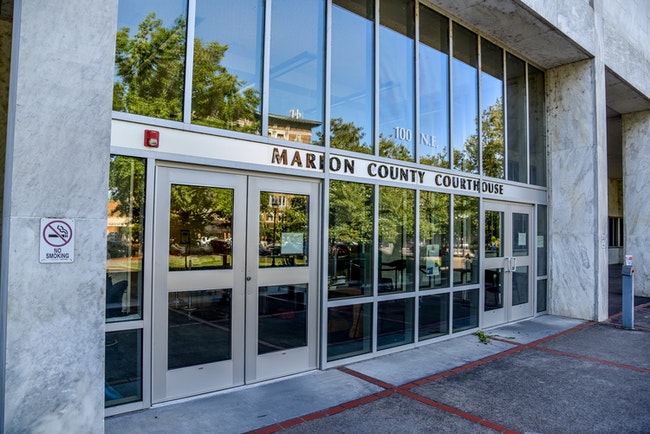 Marion County Courthouse (File/Salem Reporter)
Marion County Courthouse (File/Salem Reporter)
Citing a need to protect the integrity of the judicial system, Oregon’s top judge adopted a rule Thursday intended to restrict the ability of federal immigration agents from making arrests in the state’s courthouses. But Immigration and Customs Enforcement has already questioned the state’s authority to enact the rule.
The rule was made in response to reports of ICE agents making arrests in or near state courthouses as part of the Trump administration’s more aggressive approach towards immigration. Advocacy groups, as well as lawyers and judges, have expressed concerns that the arrests make immigrant communities reluctant to access the courts to pay fines, get protective orders or serve as witnesses.
“Arrests in courthouses have interfered with judicial proceedings and removed criminal defendants before they have been sentenced or completed their sentences,” said Oregon Supreme Court Chief Justice Martha Walters in a news release. “We are adopting this rule to maintain the integrity of our courts and provide access to justice– not to advance or oppose any political or policy agenda.”
[ Help build Salem Reporter and local news – SUBSCRIBE ]
Walters enacted the rule, which requires agencies seeking arrests have a warrant issued by a judge. ICE has relied on administrative warrants. These warrants are issued by ICE. Massachusetts, New York, New Jersey, New Mexico and California have similar restrictions. The rule was proposed by a group of immigrant, civil rights and legal advocacy organizations. In October, the Uniform Trial Court Rules Committee, comprised of judges and stakeholders in the legal system, reviewed the rule before recommending it to Walters.
The committee raised concerns that the rule would put judges in conflict with federal agents. The final rule does not require judges to take specific enforcement action but doesn’t limit their ability to enforce it. The rule prohibits non-judicial arrests only in court facilities or their vicinity, including entryways, sidewalks and parking lots.
ICE spokeswoman Tanya Roman responded with a statement arguing that the courthouse arrests are necessary because of local policies preventing law enforcement from cooperating with immigration agents. According to the statement, ICE agents already have broad authority to make arrests and aren’t required to obtain judicial warrants from what she described as overburdened courts.
“It is ironic that elected officials want to see policies in place to keep ICE out of courthouses, while caring little for laws enacted by Congress to keep criminal aliens out of our country,” reads the statement. “Despite attempts to prevent ICE officers from doing their jobs, ICE will continue to carry out its mission to uphold public safety and enforce immigration law, and consider carefully whether to refer those who obstruct our lawful enforcement efforts for criminal prosecution.”
Walters said in a statement that she has met with federal officials to discuss the arrests and will continue to do so.
Court rules are usually adopted after going through a process that includes public comment and review. Todd Sprague, spokesman for the Oregon Judicial Department, said in an email that Walters established the rule without going through the process because of the urgency of the issue that posed a “fundamental challenge to the integrity of our court system.”
The public can still weigh in on the rule once it’s posted in mid-December. It will again be reviewed by the committee in April. Once posted, comments can be made here:
https://www.courts.oregon.gov/programs/utcr/committee/Pages/default.aspx.
PREVIOUS COVERAGE:
Seeking to curb ICE courthouse arrests, immigrant advocates push for new court rule
Contact reporter Jake Thomas at 503-575-1251 or [email protected] or @jakethomas2009.









